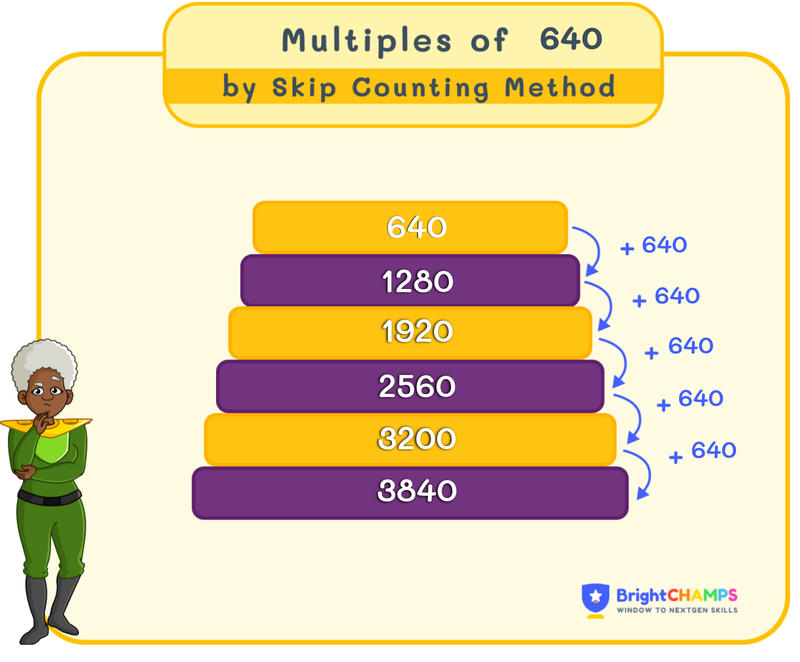


 106 Learners
106 LearnersLast updated on May 26th, 2025

Multiples of 640

In math, multiples are the products we get when multiplying a number with other numbers. Multiples play a key role in construction and design, counting groups of items, sharing resources equally, and managing time effectively. In this topic, we will learn the essential concepts of multiples of 640.
What are the Multiples of 640?
Now, let us learn more about multiples of 640. Multiples of 640 are the numbers you get when you multiply 640 by any whole number, including zero. Each number has an infinite number of multiples, including a multiple of itself.
In multiplication, a multiple of 640 can be denoted as 640 × n, where ‘n’ represents any whole number (0, 1, 2, 3,…). So, we can summarize that:
Multiple of a number = Number × Any whole number
For example, multiplying 640 × 1 will give us 640 as the product. Multiples of 640 will be larger or equal to 640.

List of First 20 Multiples of 640
Multiples of 640 include the products of 640 and an integer. Multiples of 640 are divisible by 640 evenly. The first few multiples of 640 are given below:
| TABLE OF 640 (1-10) | |
|---|---|
|
640 x 1 = 640 |
640 x 6 = 3840 |
|
640 x 2 = 1280 |
640 x 7 = 4480 |
|
640 x 3 = 1920 |
640 x 8 = 5120 |
|
640 x 4 = 2560 |
640 x 9 = 5760 |
|
640 x 5 = 3200 |
640 x 10 = 6400 |
| TABLE OF 640 (11-20) | |
|---|---|
|
640 x 11 = 7040 |
640 x 16 = 10240 |
|
640 x 12 = 7680 |
640 x 17 = 10880 |
|
640 x 13 = 8320 |
640 x 18 = 11520 |
|
640 x 14 = 8960 |
640 x 19 = 12160 |
|
640 x 15 = 9600 |
640 x 20 = 12800 |
Now, we know the first few multiples of 640. They are 0, 640, 1,280, 1,920, 2,560, 3,200, 3,840, 4,480, 5,120, 5,760, 6,400,...
Operations with Multiples of 640
Understanding the multiples of 640 helps solve mathematical problems and boost our multiplication and division skills. When working with multiples of 640, we need to apply it to different mathematical operations such as addition, subtraction, multiplication, and division.
Sum of First 5 Multiples of 640:
640, 1,280, 1,920, 2,560, and 3,200 are the first five multiples of 640. When multiplying 640 from 1 to 5, we get these numbers as the products.
So, the sum of these multiples is:
640 + 1,280 + 1,920 + 2,560 + 3,200 = 9,600
When we add the first 5 multiples of 640, the answer will be 9,600.
Subtraction of First 5 Multiples of 640:
While we do subtraction, it improves our comprehension of how the value decreases when each multiple is subtracted from the previous one. 640, 1,280, 1,920, 2,560, and 3,200 are the first five multiples of 640. So, let us calculate it as given below:
640 - 1,280 = -640
-640 - 1,920 = -2,560
-2,560 - 2,560 = -5,120
-5,120 - 3,200 = -8,320
Hence, the result of subtracting the first 5 multiples of 640 is -8,320.
Average of First 5 Multiples of 640:
To calculate the average, we need to identify the sum of the first 5 multiples of 640 and then divide it by the count, i.e., 5. Because there are 5 multiples presented in the calculation. Averaging helps us to understand the concepts of central tendencies and other values. We know the sum of the first 5 multiples of 640 is 9,600.
640 + 1,280 + 1,920 + 2,560 + 3,200 = 9,600
Next, divide the sum by 5:
9,600 ÷ 5 = 1,920
1,920 is the average of the first 5 multiples of 640.
Product of First 5 Multiples of 640:
The product of given numbers is the result of multiplying all of them together. Here, the first 5 multiples of 640 include: 640, 1,280, 1,920, 2,560, and 3,200. Now, the product of these numbers is:
640 × 1,280 × 1,920 × 2,560 × 3,200 = 2,147,483,648,000,000
The product of the first 5 multiples of 640 is 2,147,483,648,000,000.
Division of First 5 Multiples of 640:
While we perform division, we get to know how many times 640 can fit into each of the given multiples. 640, 1,280, 1,920, 2,560, and 3,200 are the first 5 multiples of 640.
640 ÷ 640 = 1
1,280 ÷ 640 = 2
1,920 ÷ 640 = 3
2,560 ÷ 640 = 4
3,200 ÷ 640 = 5
The results of dividing the first 5 multiples of 640 are: 1, 2, 3, 4, and 5.

Common Mistakes and How to Avoid Them in Multiples of 640
While working with multiples of 640, we make common mistakes. Identifying these errors and understanding how to avoid them can be helpful. Below are some frequent mistakes and tips to avoid them:

Multiples of 640 Examples

Problem 1
Lila is organizing a series of community workshops, each requiring 640 chairs. If she plans workshops every month for a year, how many chairs will be used in total?

7,680 chairs
Explanation
To find the total number of chairs used throughout the year, multiply the number of chairs needed per workshop by the number of workshops (months in a year).
Chairs needed per workshop = 640
Number of workshops (months) = 12
640 × 12 = 7,680
Therefore, 7,680 chairs will be used in total.

Problem 2
A farmer has a large field divided into sections. Each section can grow 640 plants. If he maintains 5 sections, how many plants can he grow in total?

3,200 plants
Explanation
To find the total number of plants, multiply the number of plants per section by the number of sections.
Plants per section = 640
Number of sections = 5
640 × 5 = 3,200
Thus, the farmer can grow 3,200 plants in total.

Problem 3
In an art gallery, there are 8 rooms. Each room displays 640 pieces of artwork. How many pieces of artwork are displayed in total?

5,120 pieces of artwork
Explanation
To find the total number of artworks, multiply the number of artworks in each room by the number of rooms.
Number of rooms = 8
Artworks per room = 640
8 × 640 = 5,120
So, 5,120 pieces of artwork are displayed in the gallery.

Problem 4
A factory produces 640 widgets per day. How many widgets does it produce in a week (7 days)?

4,480 widgets
Explanation
To calculate the total production in a week, multiply the daily production by the number of days in a week.
Widgets per day = 640
Days in a week = 7
640 × 7 = 4,480
Therefore, the factory produces 4,480 widgets in a week.

Problem 5
At a large event, 640 gift bags are prepared for attendees. If the event is held 3 times a year, how many gift bags are needed in total?

1,920 gift bags
Explanation
To find the total number of gift bags needed for all events, multiply the number of gift bags per event by the number of events.
Gift bags per event = 640
Number of events = 3
640 × 3 = 1,920
Thus, 1,920 gift bags are needed for all the events.


FAQs on Multiples of 640
1.How do you find the multiples of 640?
2.What is the LCM of 7 and 640?
3.What are the real-life applications of Multiples of 640?
4.Are multiples of 640 finite or infinite?
5.Is there any odd multiple of 640?
6.How can poems help children in Vietnam memorize the Multiplication Table and Multiples of 640?
7.Can learning the Multiplication Table influence creativity in solving Multiples of 640 challenges for kids in Vietnam?
8.How do language and cultural differences in Vietnam affect the way children learn the Multiplication Table and Multiples of 640?
9.What role does brain development play in mastering the Multiplication Table and Multiples of 640 among early learners in Vietnam?
Important Glossaries for Multiples of 640
- Multiple: A multiple represents the product of a number that may be multiplied by an integer. For example, multiples of 640 include 640, 1,280, 1,920, 2,560, etc.
- Number pattern: This refers to how numbers are listed. It should follow a certain sequence. Multiples of 640 are the numbers that consist of the number pattern of 640.
- Even number: An even number refers to any number that can be divisible by 2 without leaving any remainder. The last digits of even numbers are 0, 2, 4, 6, or 8. All multiples of 640 are even numbers.
- Divisor: It refers to any number by which another number can be divided without leaving any remainder. 1, 2, 4, 5, 8, 10, 16, 20, 32, 40, 64, 80, 128, 160, 320, and 640 are the divisors of 640.
- LCM (Least Common Multiple): This is the smallest number that is a multiple of two or more numbers.
Explore More multiplication-tables
 Previous to Multiples of 640
Previous to Multiples of 640
About BrightChamps in Vietnam


Seyed Ali Fathima S
About the Author
Seyed Ali Fathima S a math expert with nearly 5 years of experience as a math teacher. From an engineer to a math teacher, shows her passion for math and teaching. She is a calculator queen, who loves tables and she turns tables to puzzles and songs.

Fun Fact
: She has songs for each table which helps her to remember the tables



